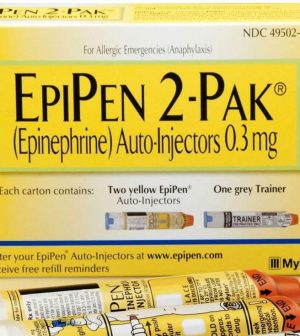- Recognizing the Signs of Hypothyroidism
- 10 Strategies to Overcome Insomnia
- Could Artificial Sweeteners Be Aging the Brain Faster?
- Techniques for Soothing Your Nervous System
- Does the Water in Your House Smell Funny? Here’s Why
- Can a Daily Dose of Apple Cider Vinegar Actually Aid Weight Loss?
- 6 Health Beverages That Can Actually Spike Your Blood Sugar
- Treatment Options for Social Anxiety Disorder
- Understanding the Connection Between Anxiety and Depression
- How Daily Prunes Can Influence Cholesterol and Inflammation
$340 Million Settlement Proposed in EpiPen Lawsuits

Pfizer Inc. has agreed to pay $345 million in a proposed settlement to resolve lawsuits over steep EpiPen price increases.
EpiPens are auto-injectable devices that deliver the drug epinephrine for emergency treatment of a life-threatening allergic reaction called anaphylaxis.
In 2016, a number of class-action lawsuits were filed against Pfizer and its subsidiaries Meridian Medical Technologies Inc. and King Pharmaceuticals, alleging they engaged in anticompetitive conduct related to EpiPen, the Associated Press reported.
Another company that is a defendant in the litigation is Mylan, which owns the EpiPen brand, even though the devices are made by Pfizer.
Mylan acquired the right to market and distribute the devices in 2007, when an EpiPen package cost about $100. Now, it costs more than $650 without pharmacy coupons or manufacturer discounts, the AP reported.
Court documents filed Thursday in federal court in Kansas City, Kansas, show that Pfizer and its two subsidiaries asked the court to give preliminary approval to the settlement, according to Kansas City’s NPR station KCUR-FM.
Three weeks ago, most of the claims against Mylan were dismissed, but the judge allowed antitrust claims against the company to proceed to trial, scheduled to start on Sept. 7, the AP reported.
Rex Sharp, a lawyer for the plaintiffs, said his clients were pleased that Pfizer had agreed to the settlement, noting it would still need the court’s approval, the AP reported
In an email to KCUR-FM, a Pfizer spokesperson denied any wrongdoing by the company and said the settlement was sought to avoid “the distraction of continued litigation and focus on breakthroughs that change patients’ lives.”
More information
The National Institute of Allergy and Infectious Diseases has more on food allergies.
Source: HealthDay
Copyright © 2026 HealthDay. All rights reserved.










